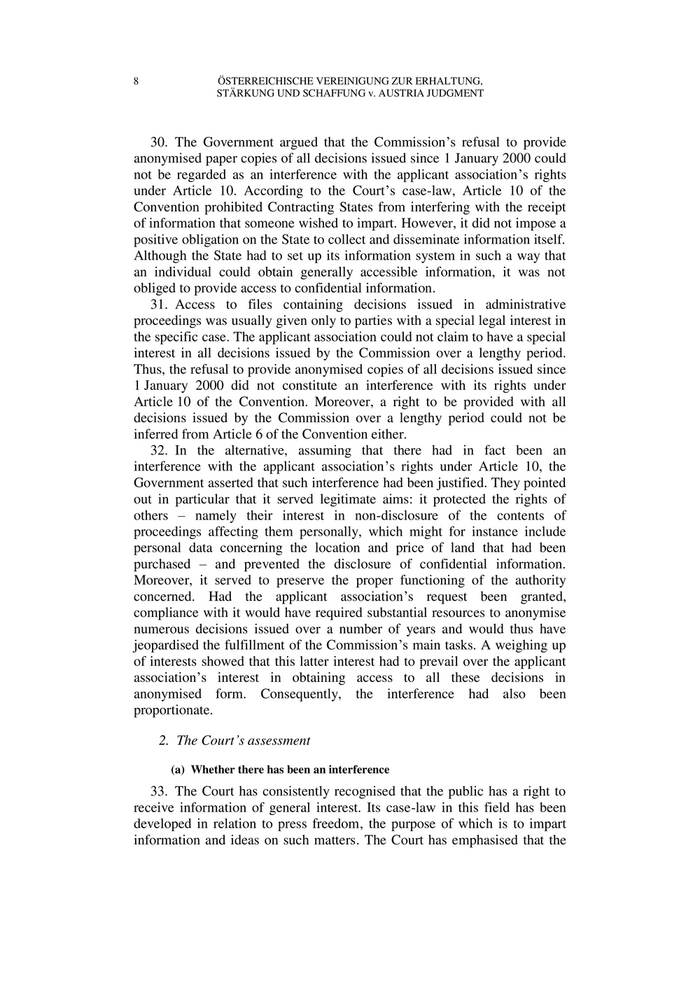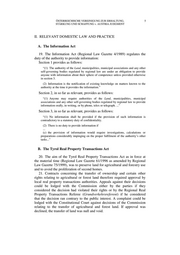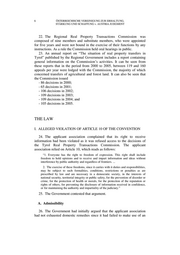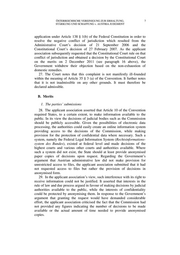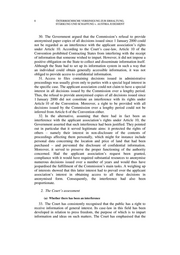Information
- Aktenzeichen
- 39534/07
- Datum
- 28. November 2013
- Gericht
- Europäischer Gerichtshof für Menschenrechte
- Gesetz
- Europäische Menschenrechtskonvention
Urteil: Europäischer Gerichtshof für Menschenrechte am 28. November 2013
39534/07
In dem Fall "Österreichische Vereinigung zur Erhaltung, Stärkung und Schaffung eines wirtschaftlich gesunden land- und forstwirtschaftlichen Grundbesitzes gegen Österreich" entscheidet der Europäische Gerichtshof für Menschenrechte, dass einer Nichtregierungsorganisation das Recht auf Zugang zu (anonymisierten) Entscheidungen der nationalen Behörde (Tiroler Landes-Grundverkehrskommission) einzuräumen ist. Die Verweigerung der Herausgabe von Informationen, die, wie hier gegeben, im öffentlichen Interesse liegen, verletzt Art. 10 Europäische Menschenrechtskonvention. Der von der Akten führenden Stelle geltend gemachte Aufwand hätte bereits durch eine aktive Veröffentlichung der einzelnen Entscheidungen vermieden werden können. (Quelle: LDA Brandenburg)
Allgemein zugängliche Quelle Anwendungsbereich/ Zuständigkeit Veröffentlichung von Informationen
FIRST SECTION CASE OF ÖSTERREICHISCHE VEREINIGUNG ZUR ERHALTUNG, STÄRKUNG UND SCHAFFUNG EINES WIRTSCHAFTLICH GESUNDEN LAND- UND FORST- WIRTSCHAFTLICHEN GRUNDBESITZES v. AUSTRIA (Application no. 39534/07) JUDGMENT STRASBOURG 28 November 2013 This judgment will become final in the circumstances set out in Article 44 § 2 of the Convention. It may be subject to editorial revision.


ÖSTERREICHISCHE VEREINIGUNG ZUR ERHALTUNG, 1 STÄRKUNG UND SCHAFFUNG v. AUSTRIA JUDGMENT In the case of Österreichische Vereinigung zur Erhaltung, Stärkung und Schaffung eines wirtschaftlich gesunden land- und forstwirt- 1 schaftlichen Grundbesitzes v. Austria , The European Court of Human Rights (First Section), sitting as a Chamber composed of: Isabelle Berro-Lefèvre, President, Elisabeth Steiner, Khanlar Hajiyev, Mirjana Lazarova Trajkovska, Julia Laffranque, Linos-Alexandre Sicilianos, Erik Møse, judges, and Søren Nielsen, Section Registrar, Having deliberated in private on 5 November 2013, Delivers the following judgment, which was adopted on that date: PROCEDURE 1. The case originated in an application (no. 39534/07) against the Republic of Austria lodged with the Court under Article 34 of the Convention for the Protection of Human Rights and Fundamental Freedoms (“the Convention”) by an association registered in Austria, the Österreichische Vereinigung zur Erhaltung, Stärkung und Schaffung eines wirtschaftlich gesunden land- und forstwirtschaftlichen Grundbesitzes (“the applicant association”), on 24 August 2007. 2. The applicant association was represented by Mr R. Mutenthaler, a lawyer practising in Ybbs. The Austrian Government (“the Government”) were represented by their Agent, Ambassador H. Tichy, Head of the International Law Department at the Federal Ministry for European and International Affairs. 3. The applicant association alleged that the refusal of the Tyrol Real Property Transactions Commission to grant it access to all its decisions issued since January 2000 amounted to a violation of its right to receive information. 4. On 10 March 2010 the application was communicated to the Government. 1 For citation purposes, the short title Österreichische Vereinigung zur Erhaltung, Stärkung und Schaffung v. Austria should be used.

2 ÖSTERREICHISCHE VEREINIGUNG ZUR ERHALTUNG, STÄRKUNG UND SCHAFFUNG v. AUSTRIA JUDGMENT THE FACTS I. THE CIRCUMSTANCES OF THE CASE 5. The applicant is a registered association which has its seat in Vienna. Its aim is to research and study past and present transfers of ownership of agricultural and forest land in order to reach conclusions as to the impact of such transfers on society. The applicant association also gives opinions on draft laws falling within its field of interest. 6. In essence, agricultural and forest land transactions require approval by local and regional authorities. The latter are called Regional Real Property Transactions Commissions (Landes-Grundverkehrs-kommis- sionen). The aim of this requirement, laid down in the Real Property Transactions Acts of the Länder, is to preserve land for agricultural use and forestry and, in some of the regions including Tyrol, to avoid the proliferation of second homes. The applicant association states that it is sent all decisions issued by the Regional Real Property Transactions Commissions with the exception of the one for Tyrol. In the decisions it receives, the names of parties and other sensitive data are usually anonymised. 7. On 26 April 2005 the association asked the Tyrol Real Property Transactions Commission (“the Commission”) to provide, by mail, all decisions issued since 1 January 2005 in anonymised form, the costs thereof to be reimbursed. By letter of 12 July 2005 the Commission replied that it could not comply with the request owing to lack of time and personnel. 8. On 18 July 2005 the applicant association submitted a further request, this time requesting the provision, by mail, of all decisions issued since 1 January 2000 in anonymised form. In the event of refusal of the application, it demanded a formal decision in accordance with the Tyrol Access to Information Act (Tiroler Auskunftspflichtgesetz - “the Information Act”). The applicant association argued that since the Commission’s decisions concerned “civil rights” within the meaning of Article 6 of the Convention, the decisions should be either publicly announced or made public by other appropriate means. 9. In its decision of 10 October 2005 the Commission rejected the request, holding that the transmission of anonymised copies of its decisions did not constitute information within the meaning of section 1(2) of the Information Act, which defines information as “existing knowledge on matters known to the authority at the time it provides the information”. Moreover, even if the request were to fall within the scope of that provision, the Information Act stated that pursuant to section 3(1) subparagraph (c) there was no duty to provide the information if doing so would require so many resources that the functioning of the authority would be affected. The decision stated that complaints could be lodged with the Constitutional

ÖSTERREICHISCHE VEREINIGUNG ZUR ERHALTUNG, 3 STÄRKUNG UND SCHAFFUNG v. AUSTRIA JUDGMENT Court (Verfassungsgerichtshof) and the Administrative Court (Verwaltungs- gerichtshof). 10. The applicant association complained to both the Constitutional Court and the Administrative Court. It relied on Article 10 of the Convention. 11. In its submissions in reply to the applicant association’s complaint to the Constitutional Court and the Administrative Court, the Commission maintained that its decisions did not constitute information within the meaning of the Information Act. It argued that a decision contained the facts of the case and the legal conclusions the authority had drawn from them. Legal arguments could be discussed and decisions could be challenged and set aside if the legal conclusions were found to be wrong. Therefore, giving someone access to a decision was comparable to giving someone legal advice, as opposed to providing information as defined in the Information Act. 12. On 21 September 2006 the Administrative Court declared that it did not have jurisdiction to deal with the case and rejected the applicant association’s complaint. The Administrative Court held that it was only competent to deal with complaints against decisions regarding transfers of building plots and not with complaints brought against the Commission’s decisions on transfers of agricultural or forest land. As the applicant association had not claimed to have been party to the transfer of a building plot, it could not base its complaint on that status. Neither did the Information Act contain any rule stating that complaints about decisions by the Commission pursuant to the Information Act were to be lodged with the Administrative Court. Therefore the matter was excluded from the Administrative Court’s jurisdiction. Consequently, the statement in the Commission’s decision that a complaint could be lodged with the Administrative Court was not correct. 13. On 27 February 2007 the Constitutional Court declined to deal with the case for lack of prospects of success from the perspective of constitutional law, and also because the matter was not excluded from the Administrative Court’s jurisdiction. The decision was served on the association’s representative on 4 April 2007. 14. After the Government had been notified of the present application, the applicant association, relying on the Government’s argument in respect of exhaustion of domestic remedies (see paragraph 26 below), lodged an application under Article 138 of the Federal Constitution seeking a ruling from the Constitutional Court on the negative conflict of jurisdiction between it and the Administrative Court. 15. On 2 December 2011 the Constitutional Court issued a decision stating that it was competent to rule on the applicant association’s complaint against the Commission’s decision of 10 October 2005. Consequently, it set

4 ÖSTERREICHISCHE VEREINIGUNG ZUR ERHALTUNG, STÄRKUNG UND SCHAFFUNG v. AUSTRIA JUDGMENT aside its own decision of 27 February 2007 and awarded the applicant association reimbursement of the costs of the proceedings. 16. In a further decision of 2 December 2011, the Constitutional Court ruled on the merits of the applicant association’s complaint. Referring to the Court’s case-law and its own case-law, it held in particular that whilst the right to receive information enshrined in Article 10 of the Convention prohibited States from restricting the receipt of information that others wished to or might be willing to impart, it did not – by contrast – impose a positive obligation on States to collect and disseminate information of their own motion. The Constitutional Court added that, in accordance with its established case-law, Article 10 did not require the State to grant access to information or to make information available of its own motion. Consequently, the Commission’s refusal to transmit anonymised copies of all decisions issued during a specific period of time to the applicant association did not constitute an interference with the latter’s right under Article 10 of the Convention. 17. As to the applicant association’s argument that the Commission’s decision was arbitrary as it had failed to provide reasons, the Constitutional Court referred to the explanatory report on the Information Act and endorsed the Commission’s view that the applicant association’s request was not merely a question of obtaining information about one or more specific issues, but would require the Commission to compile – of its own motion – all decisions issued over a period of some years, to anonymise them, and to send paper copies thereof to the applicant association. The Commission had therefore rightly taken the view that the applicant association’s request did not fall within the scope of section 1 of the Information Act. Moreover, the Commission had also dealt with the merits of the request in that it had concluded that the provision of information could be refused pursuant to section 3(1) subparagraph (c) of the Information Act as it would require investigations, calculations or preparations considerably impinging on the fulfilment of its other tasks. 18. Lastly, the Constitutional Court observed that the applicant association could be implicitly relying also on Article 6 of the Convention. It noted that neither the Court’s case-law in respect of public access to court decisions nor its own case-law guaranteed the right to obtain anonymised copies of all decisions issued by the Commission over a lengthy period. According to the Constitutional Court’s case-law, access had to be given to the judgments delivered by the highest courts which dealt with cases raising important legal issues. However, this did not apply to all the Commission’s decisions.

ÖSTERREICHISCHE VEREINIGUNG ZUR ERHALTUNG, 5 STÄRKUNG UND SCHAFFUNG v. AUSTRIA JUDGMENT II. RELEVANT DOMESTIC LAW AND PRACTICE A. The Information Act 19. The Information Act (Regional Law Gazette 4/1989) regulates the duty of the authority to provide information: Section 1 provides as follows: “(1) The authority of the Land, municipalities, municipal associations and any other self-governing bodies regulated by regional law are under an obligation to provide anyone with information about their sphere of competence unless provided otherwise in section 3. (2) Information is the notification of existing knowledge on matters known to the authority at the time it provides the information.” Section 2, in so far as relevant, provides as follows: “(1) Anyone may require authorities of the Land, municipalities, municipal associations and any other self-governing bodies regulated by regional law to provide information orally, in writing, or by phone, telex or telegraph. ...” Section 3, in so far as relevant, provides as follows: “(1) No information shall be provided if the provision of such information is contradictory to a statutory duty of confidentiality. (2) There is no duty to provide information if ... (c) the provision of information would require investigations, calculations or preparations considerably impinging on the proper fulfilment of the authority’s other tasks...” B. The Tyrol Real Property Transactions Act 20. The aim of the Tyrol Real Property Transactions Act as in force at the material time (Regional Law Gazette 61/1996 as amended by Regional Law Gazette 75/1999), was to preserve land for agricultural and forestry use and to avoid the proliferation of second homes. 21. Contracts concerning the transfer of ownership and certain other rights relating to agricultural or forest land therefore required approval by local real property transactions authorities. Appeals against their decisions could be lodged with the Commission either by the parties if they considered the decision had violated their rights or by the Regional Real Property Transactions Referee (Grundverkehrsreferent) if he considered that the decision ran contrary to the public interest. A complaint could be lodged with the Constitutional Court against decisions of the Commission relating to the transfer of agricultural and forest land. If approval was declined, the transfer of land was null and void.

6 ÖSTERREICHISCHE VEREINIGUNG ZUR ERHALTUNG, STÄRKUNG UND SCHAFFUNG v. AUSTRIA JUDGMENT 22. The Regional Real Property Transactions Commission was composed of nine members and substitute members, who were appointed for five years and were not bound in the exercise of their functions by any instructions. As a rule the Commission held oral hearings in public. 23. An annual report on “The situation of real property transfers in Tyrol” published by the Regional Government includes a report containing general information on the Commission’s activities. It can be seen from these reports that in the period from 2000 to 2005, between 119 and 160 appeals per year were lodged with the Commission, the majority of which concerned transfers of agricultural and forest land. It can also be seen that the Commission issued - 86 decisions in 2000; - 65 decisions in 2001; - 106 decisions in 2002; - 109 decisions in 2003; - 109 decisions in 2004; and - 105 decisions in 2005. THE LAW I. ALLEGED VIOLATION OF ARTICLE 10 OF THE CONVENTION 24. The applicant association complained that its right to receive information had been violated as it was refused access to the decisions of the Tyrol Real Property Transactions Commission. The applicant association relied on Article 10, which reads as follows: “1. Everyone has the right to freedom of expression. This right shall include freedom to hold opinions and to receive and impart information and ideas without interference by public authority and regardless of frontiers. ... 2. The exercise of these freedoms, since it carries with it duties and responsibilities, may be subject to such formalities, conditions, restrictions or penalties as are prescribed by law and are necessary in a democratic society, in the interests of national security, territorial integrity or public safety, for the prevention of disorder or crime, for the protection of health or morals, for the protection of the reputation or rights of others, for preventing the disclosure of information received in confidence, or for maintaining the authority and impartiality of the judiciary.” 25. The Government contested that argument. A. Admissibility 26. The Government had initially argued that the applicant association had not exhausted domestic remedies since it had failed to make use of an
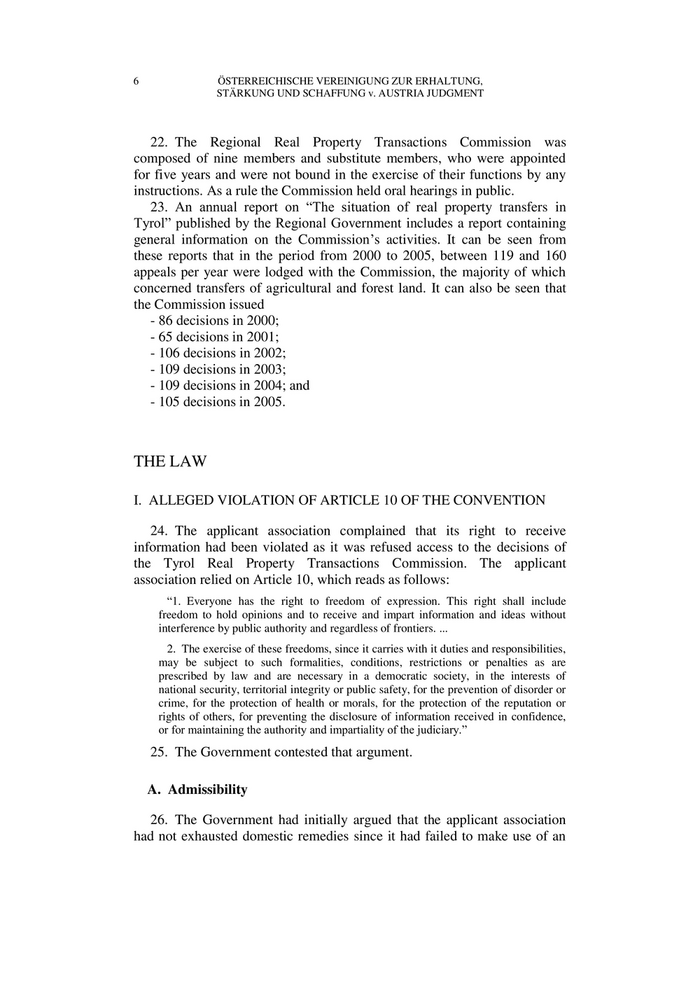
ÖSTERREICHISCHE VEREINIGUNG ZUR ERHALTUNG, 7 STÄRKUNG UND SCHAFFUNG v. AUSTRIA JUDGMENT application under Article 138 § 1(b) of the Federal Constitution in order to resolve the negative conflict of jurisdiction which resulted from the Administrative Court’s decision of 21 September 2006 and the Constitutional Court’s decision of 27 February 2007. As the applicant association subsequently requested that the Constitutional Court rule on that conflict of jurisdiction and obtained a decision by the Constitutional Court on the merits on 2 December 2011 (see paragraph 16 above), the Government withdrew their objection based on the non-exhaustion of domestic remedies. 27. The Court notes that this complaint is not manifestly ill-founded within the meaning of Article 35 § 3 (a) of the Convention. It further notes that it is not inadmissible on any other grounds. It must therefore be declared admissible. B. Merits 1. The parties’ submissions 28. The applicant association asserted that Article 10 of the Convention required States, to a certain extent, to make information available to the public. In its view the decisions of judicial bodies such as the Commission should be publicly accessible. Given the possibilities of electronic data processing, the authorities could easily create an online information system providing access to the decisions of the Commission, while making provision for the protection of confidential data where necessary. Such a system, namely the Federal Legal Information System (Rechtsinformations- system des Bundes), existed at federal level and made decisions of the highest courts and various other courts and authorities available. Where such a system did not exist, the State should at least provide anonymised paper copies of decisions upon request. Regarding the Government’s argument that Austrian administrative law did not make provision for unrestricted access to files, the applicant association submitted that it had not requested access to files but rather the provision of decisions in anonymised form. 29. In the applicant association’s view, such interference with its right to receive information could not be justified. It asserted that interests in the rule of law and due process argued in favour of making decisions by judicial authorities available to the public, while the interests of confidentiality could be protected by anonymising them. In response to the Government’s argument that granting the request would have demanded considerable effort, the applicant association criticised the fact that the Commission had not provided any figures indicating the number of decisions to be made available or the actual amount of time needed to provide anonymised copies.
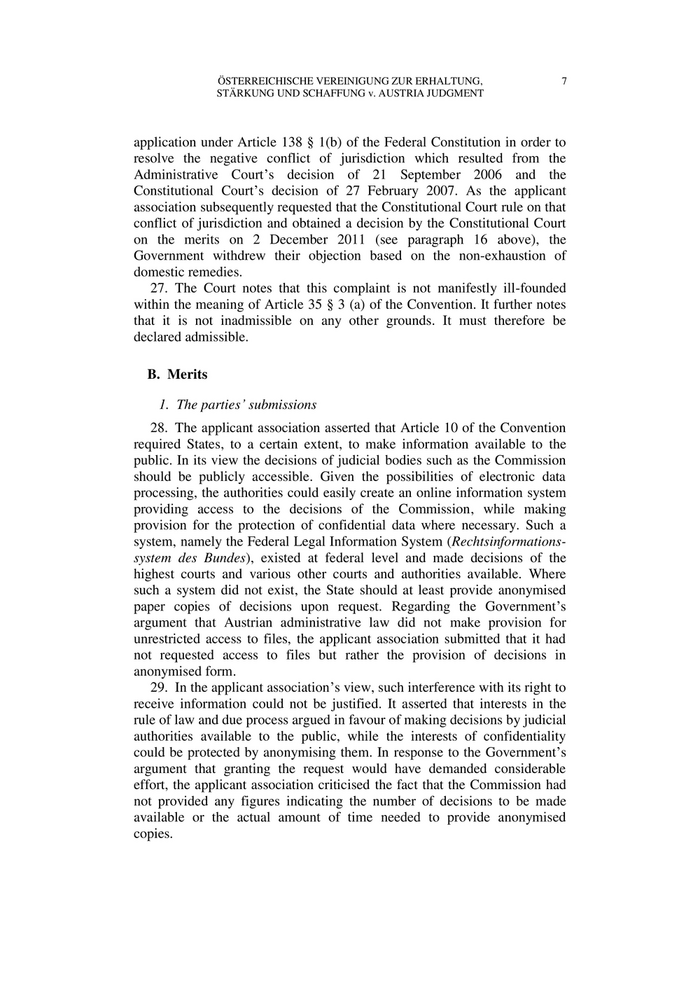
8 ÖSTERREICHISCHE VEREINIGUNG ZUR ERHALTUNG, STÄRKUNG UND SCHAFFUNG v. AUSTRIA JUDGMENT 30. The Government argued that the Commission’s refusal to provide anonymised paper copies of all decisions issued since 1 January 2000 could not be regarded as an interference with the applicant association’s rights under Article 10. According to the Court’s case-law, Article 10 of the Convention prohibited Contracting States from interfering with the receipt of information that someone wished to impart. However, it did not impose a positive obligation on the State to collect and disseminate information itself. Although the State had to set up its information system in such a way that an individual could obtain generally accessible information, it was not obliged to provide access to confidential information. 31. Access to files containing decisions issued in administrative proceedings was usually given only to parties with a special legal interest in the specific case. The applicant association could not claim to have a special interest in all decisions issued by the Commission over a lengthy period. Thus, the refusal to provide anonymised copies of all decisions issued since 1 January 2000 did not constitute an interference with its rights under Article 10 of the Convention. Moreover, a right to be provided with all decisions issued by the Commission over a lengthy period could not be inferred from Article 6 of the Convention either. 32. In the alternative, assuming that there had in fact been an interference with the applicant association’s rights under Article 10, the Government asserted that such interference had been justified. They pointed out in particular that it served legitimate aims: it protected the rights of others – namely their interest in non-disclosure of the contents of proceedings affecting them personally, which might for instance include personal data concerning the location and price of land that had been purchased – and prevented the disclosure of confidential information. Moreover, it served to preserve the proper functioning of the authority concerned. Had the applicant association’s request been granted, compliance with it would have required substantial resources to anonymise numerous decisions issued over a number of years and would thus have jeopardised the fulfillment of the Commission’s main tasks. A weighing up of interests showed that this latter interest had to prevail over the applicant association’s interest in obtaining access to all these decisions in anonymised form. Consequently, the interference had also been proportionate. 2. The Court’s assessment (a) Whether there has been an interference 33. The Court has consistently recognised that the public has a right to receive information of general interest. Its case-law in this field has been developed in relation to press freedom, the purpose of which is to impart information and ideas on such matters. The Court has emphasised that the
